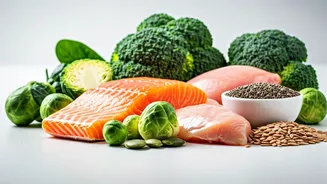Chickpeas: Versatile Protein
Chickpeas, also known as garbanzo beans, lead the charge as a fantastic source of vegetarian protein. These legumes are incredibly adaptable, offering
a wide range of culinary possibilities. They can be roasted until crispy for a snack, blended into creamy hummus for dipping, or added to stews and salads for extra substance. Not only are chickpeas high in protein, but they also provide fiber, which aids in digestion and keeps you feeling full. They're also a good source of iron, important for energy and overall health. Incorporating chickpeas into your diet is simple, affordable, and can drastically improve your nutritional profile.
Lentils: Nutritional Powerhouse
Lentils are another excellent plant-based protein source, available in various forms like brown, green, and red, each offering a slightly different flavor and texture. They're quick to cook, making them a convenient option for busy individuals. Lentils are packed with protein and fiber and are also rich in iron and folate, which is vital for cell growth and development. From hearty lentil soups and stews to lentil salads and curries, the culinary uses of lentils are vast. Their ability to absorb flavors makes them a perfect ingredient for a variety of dishes. Adding lentils to your meals can significantly boost your protein intake while offering a wealth of additional nutrients.
Tofu: Soy Protein Source
Tofu, derived from soybeans, is a versatile ingredient that readily absorbs the flavors of whatever it's cooked with. It's a complete protein, containing all nine essential amino acids, which is rare for plant-based foods. Tofu can be prepared in numerous ways; it can be crumbled and scrambled to mimic eggs, cubed and stir-fried, or marinated and baked for a hearty meal. Firm and extra-firm tofu varieties are best for grilling and baking, while silken tofu works well in smoothies and sauces. Its neutral taste makes it an excellent base for both sweet and savory dishes, allowing you to create dishes that align with your preference.
Tempeh: Fermented Goodness
Tempeh, also derived from soybeans, is a fermented food that offers a different texture and slightly nutty flavor compared to tofu. This process of fermentation enhances the digestibility of tempeh and promotes gut health. Tempeh is a complete protein source and contains a good amount of probiotics, contributing to overall well-being. It has a firm texture that makes it easy to slice, dice, and incorporate into various dishes. Whether you grill it, stir-fry it, or bake it, tempeh adds a satisfying bite to your meals. Explore the versatility of tempeh and benefit from its nutritional value and unique taste.
Quinoa: Ancient Grain Power
Quinoa, often treated like a grain, is actually a seed and a complete protein source. It is rich in all nine essential amino acids, making it an excellent option for vegetarians and vegans. Quinoa cooks quickly and has a slightly nutty flavor that complements a variety of dishes. It can be used as a base for salads, a side dish, or a breakfast porridge. It also provides fiber, which aids in digestion and helps regulate blood sugar levels. Incorporating quinoa into your diet is easy, healthy, and offers a versatile way to enhance your protein intake while adding a satisfying texture and taste to your meals.
Edamame: Snackable Protein
Edamame, or young soybeans, are a convenient and tasty source of vegetarian protein. They're often enjoyed as a snack, steamed or boiled and sprinkled with salt. Edamame is also a good source of fiber, vitamins, and minerals. You can add edamame to salads, stir-fries, or enjoy them as a side dish. Their slightly sweet and nutty flavor makes them a popular choice. These beans are a simple and delicious way to increase your protein intake and enjoy a healthy and satisfying snack or meal component.
Nuts & Seeds: Protein Boosters
Nuts and seeds are excellent sources of protein, with each offering different nutritional benefits. Almonds, walnuts, and chia seeds are excellent choices. They're easy to incorporate into your diet, offering a convenient way to boost your protein intake. You can sprinkle them on salads, add them to smoothies, or eat them as a snack. Nuts and seeds also provide healthy fats, fiber, and various vitamins and minerals. Eating nuts and seeds adds flavor, texture, and essential nutrients to your diet, supporting overall health and helping you meet your daily protein needs in a convenient and delicious way.
Spirulina: Nutrient-Dense Algae
Spirulina, a blue-green algae, is an exceptional source of protein and essential nutrients. It's a complete protein, containing all nine essential amino acids. Spirulina is also rich in vitamins, minerals, and antioxidants, offering numerous health benefits. It can be added to smoothies, juices, or even sprinkled on food. Spirulina has a slightly earthy taste, which can be masked by mixing it with other ingredients. This nutrient-dense algae is a remarkable addition to a vegetarian diet. It helps ensure you get enough protein and other essential nutrients in an easily digestible and accessible form.











